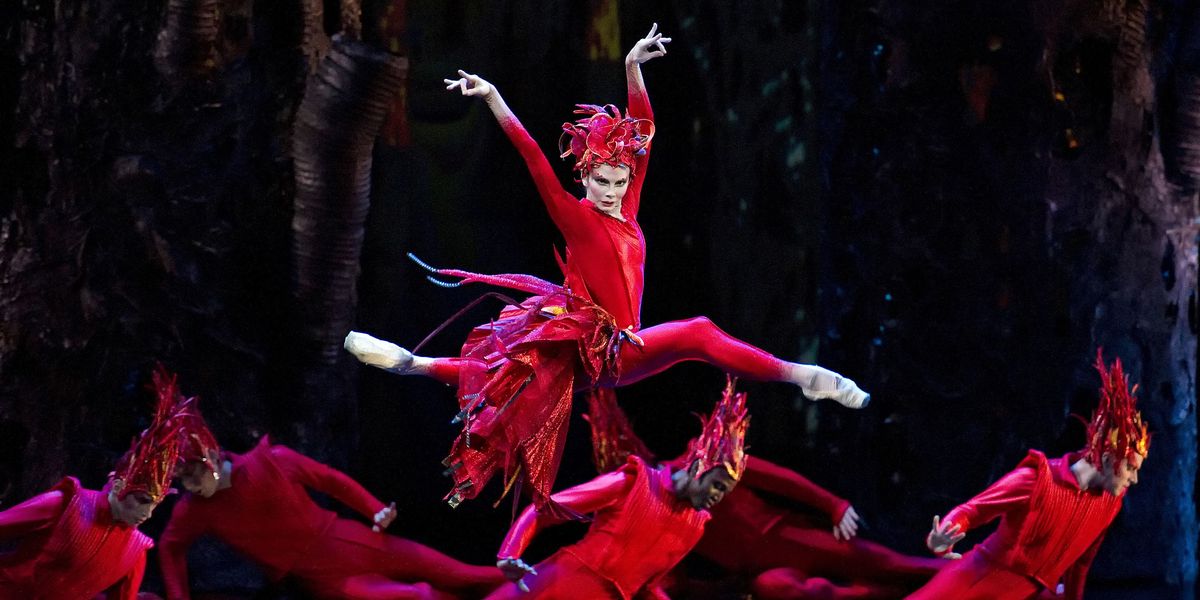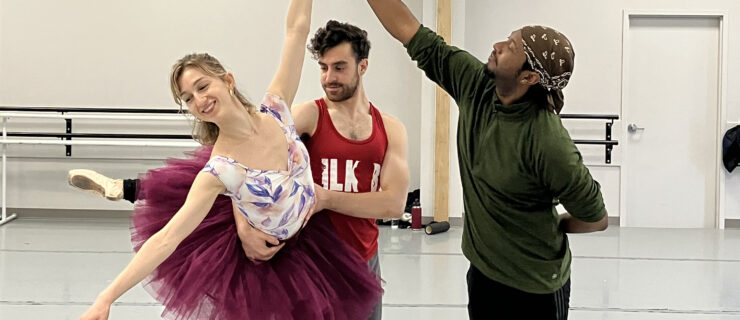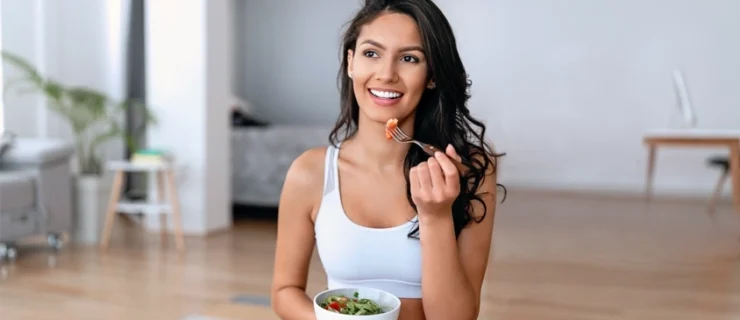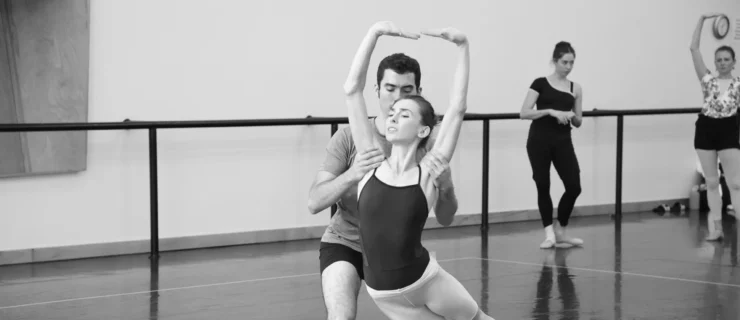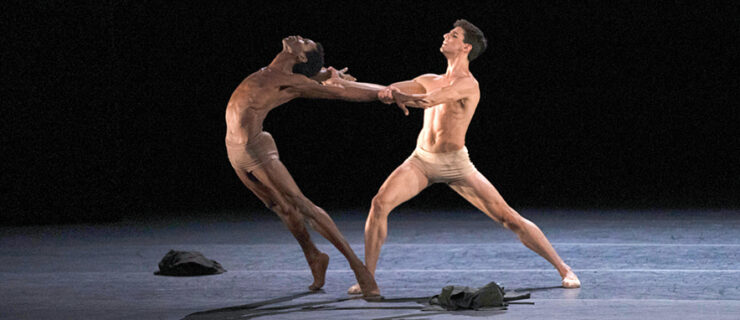Natalia Osipova: Confessions of a Superstar
Press room, Metropolitan Opera House, New York City, before show time (loud bells interrupt us between 7:40 and 8 pm). Natalia Osipova, American Ballet Theatre’s 26-year-old star ballerina, has come from rehearsal wearing a purple T-shirt over crocheted tights and down booties. No makeup, heart-shaped face, small features, black hair pulled back, like a fresh-faced elf. Osipova’s continent-straddling career—she and fiancé Ivan Vasiliev are also principals at the Mikhailovsky Theatre in St. Petersburg, after their headline-grabbing departure from the Bolshoi Ballet—has made her an international name. She puts feet up on couch, asking if I mind. I don’t!
You told me once that your parents moved back to Russia from Israel, and that you spent summers with your grandmother in Israel.
Yes, that’s true. It was hard times in the USSR when they were young. They wanted a better life. Israel was a young state. If you had relatives there you could get a visa. But after a while it didn’t go well, so they moved back. My sister and I were both born in Moscow.
Parents?
I come from a simple family, you could say working class. Mama went to school, then she met my father. She had a child—and she was a mom. That was her profession from then on, and she did it very well.
What was your father’s work?
He was educated as an engineer. But he did sports.
Really, which?
Karate. He was talented. But he got a knee injury. So he went into another sphere. He did everything for the family. He ran around [she waves her arms in the air] so we could have toys and pretty dresses. When I was born, in 1986, the Soviet Union was beginning to break up. People were poor. I feel very grateful to my parents. I never lacked for anything.
Did your father’s karate background lead to your studying gymnastics?
Yes. He used to stretch me, and lift me over his head, and do all kinds of interesting things when I was small. I started studying around 4 or 5 at small studios. When I was 8, I got a spine injury. They thought if I continued, I would feel the injury all my life. But after I started ballet it went away.
Where did you start ballet?
I spent some time in Leonid Lavrovsky’s private ballet school in Moscow. Then I was accepted into the Bolshoi Ballet’s Moscow school.
Did you like it?
No! It was not very interesting. I came from sport! Every day, those same pliés at the barre [she makes a face]. I didn’t pay attention to the teacher. I looked out the window. I was more interested in playing street games after school with the other kids. But I was good at ballet.
Gymnastics had helped?
Not entirely. There were problems too. You stand parallel a lot in gymnastics, not turned out. I had to fight to get turnout.
You went into the Bolshoi right out of school?
Yes, they took 4 of us from my class of girls, out of 11.
What role did Alexei Ratmansky play in your career?
Ratmansky gave me my career. He and I came into the Bolshoi together [Osipova into the corps de ballet, Ratmansky as the Bolshoi’s new director]. He was young. He noticed young talent. He wanted something new—new repertoire, new faces, fresh air. I didn’t dance much in the corps de ballet, but I danced variations and pas de deux. I danced in Balanchine’s Symphony in C, the third movement. After one year I got to dance my first major role, Kitri in Don Quixote.
I read in another interview that, after you danced Kitri, people didn’t think you could do other kinds of roles.
Yes, Kitri is such a bright role. You do it with temperament. People think that’s your “emploi” [the style that suits you]. You have to show them otherwise. Giselle is the first role where I could show I could do other kinds of things.
The Giselle you just danced at ABT with David Hallberg was very powerful. What did you discover in the role this time?
Something about not over-demonstrating love. When we first danced Giselle together, we were like children—very emotional. Very demonstrative about Albrecht and Giselle being in love. Now we’re both more mature. We can trust that stage chemistry, which already is deeper. I had the impression onstage that I looked into his eyes, and from that moment I couldn’t tear myself away.
What is it like for you, on the stage?
[She thinks.] In Romeo and Juliet, Giselle, La Sylphide, sometimes there’s that moment when I can, like, love more than one loves in life. I can feel more strongly than in life.
And Gamzatti in
Bayadère, which you just danced here at ABT?
When I was young, and danced it a couple of times at the Bolshoi, I didn’t like the role at all. I didn’t believe I could be that hard a person—such a bitch. I’m a positive person—I love people. Now I’m older. I’ve lived through things. It got interesting to become a bad person. I wanted to base the role this time on loving Solor. Everything happens because of love for Solor.
Much has been written about you and your fiancé, Ivan Vasiliev, leaving the Bolshoi for St. Petersburg’s Mikhailovsky, about wanting not to be typecast. How do you feel now about that move?
I don’t regret the decision. It feels much simpler and easier now without the Bolshoi. Maybe I’m that kind of person—not liking to be tied to one place.
How is it working with Nacho Duato, the new artistic director of ballet at the Mikhailovsky?
It’s interesting! He’s making a new Romeo and Juliet on me and Vasiliev. It’s nice to work there. More peaceful. The theater is smaller, more human-scale. There’s a great coach, Zhanna Ayupova. We’ve worked through several roles together already.
But where’s your home?
[Laughs.] We don’t have a home now! Our home is where we are working. It’s not so bad—I’m here in New York for two and a half months, in a rented apartment. In St. Petersburg I live in a rented apartment. Of course, Moscow is “home”—my parents are there. It’s too bad we can’t appear as guests at the Bolshoi, but that’s their attitude.
What are your dreams for the future?
[Laughs.] I’m full, I’m…[She says a Russian word for this that I don’t know. But she wants me to know it, so she looks it up on her iPhone. It means when you’ve eaten your fill—satiated.] I’m young. I’ve already done so many ballets. I can’t imagine life without dance. But it’s not like a religion as it is for some people. In the future I’ll maybe have a child, maybe two. I would hope that I could be happy as a woman.
How do you define ballerina?
[Laughs again.] Ballerina! What a term! I suppose I’m a ballerina. I dance all the time. I sew my shoes in the evening. It doesn’t matter what they call me. It’s the same with reviews. I don’t worry about them—good, bad—it’s the same to me. I get pleasure from dancing. I feel myself happy. I was born to give people happiness on the stage.
What’s the secret of your jump?
[Pauses, laughs.] Nature!
What do you do to relax?
I love to watch films. Not just Russian—Hollywood films, too. I love The Godfather, all three parts. Wonderful atmosphere. I love Al Pacino. But my favorite actor is Tom Hanks. On the surface he looks like nothing special. Then he transforms himself into something different for every role.
What advice do you have for young dancers?
Advice for young dancers? [She laughs.] In school, listen to the teacher. In the theater, listen to yourself. There’s nobody but you, finally. Listen to your heart. It will tell you what’s interesting for the audience.
